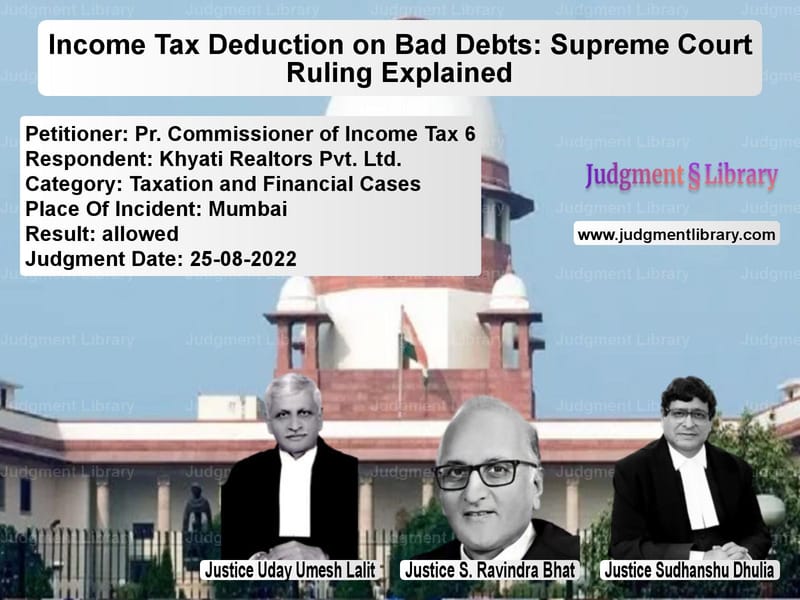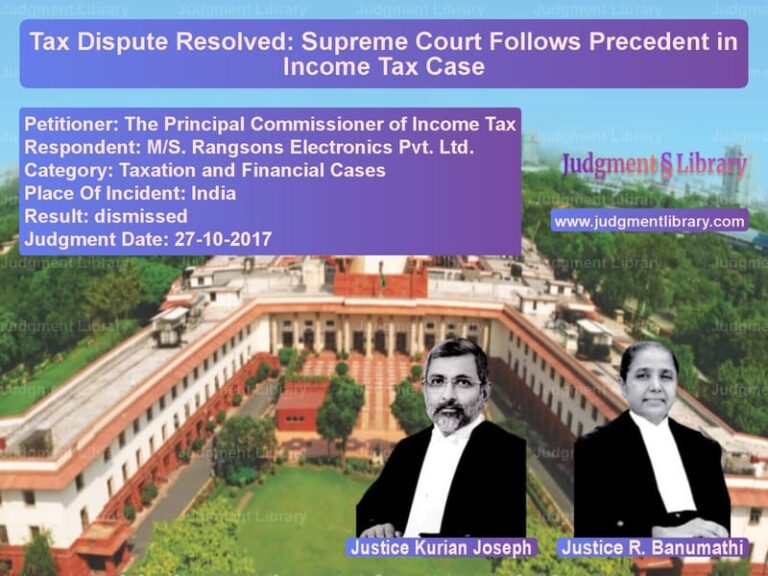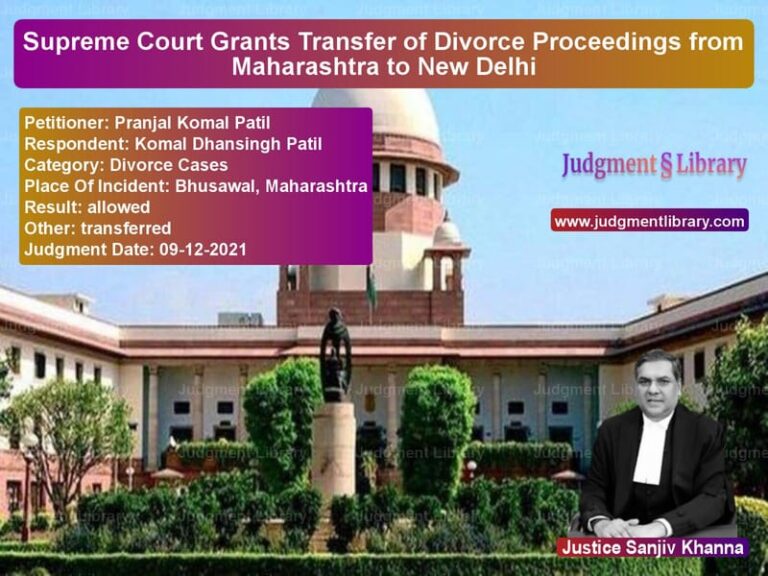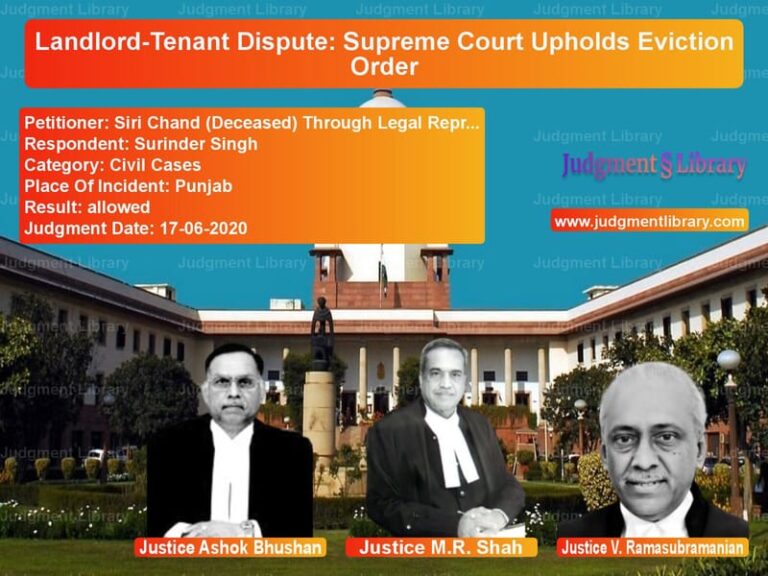Income Tax Deduction on Bad Debts: Supreme Court Ruling Explained
The Supreme Court of India recently delivered a significant judgment in the case of Pr. Commissioner of Income Tax 6 vs. Khyati Realtors Pvt. Ltd., addressing the issue of bad debt write-offs under the Income Tax Act, 1961. The case revolved around whether a sum of ₹10 crores written off by the respondent as a bad debt was permissible under Sections 36(1)(vii) and 36(2) of the Act.
The Revenue challenged the Bombay High Court’s decision that upheld the Income Tax Appellate Tribunal (ITAT)’s ruling in favor of the assessee. The Supreme Court’s decision provided clarity on the conditions under which bad debt can be written off and the applicability of Section 37 for business expenses.
Background of the Case
The respondent, Khyati Realtors Pvt. Ltd., is engaged in real estate development, trading in transferable development rights, and financing. The dispute arose over an amount of ₹10 crores advanced to M/s C. Bhansali Developers Pvt. Ltd. in 2007 for acquiring commercial premises. The assessee later wrote off this amount as a bad debt in the financial year 2009-10, claiming a deduction under Section 36(1)(vii) of the Income Tax Act.
The Revenue argued that the assessee had not substantiated its claim that the amount was given in the ordinary course of business and failed to prove compliance with Section 36(2). Furthermore, the claim that the amount was a loan lacked supporting evidence regarding its terms and conditions.
Arguments by the Petitioner (Revenue)
- The Revenue contended that under Section 36(1)(vii), an assessee can claim a deduction for bad debt only if it satisfies the conditions under Section 36(2), which were not met in this case.
- It was argued that the ITAT and High Court erred in accepting the assessee’s contentions without proper documentary evidence.
- The claim of giving ₹10 crores for the project lacked proof of payment details, repayment terms, or interest provisions.
- The assessee failed to show that the amount was written off as irrecoverable in its accounts as required by law.
Arguments by the Respondent (Khyati Realtors Pvt. Ltd.)
- The assessee argued that it was engaged in real estate and financing, making such advances part of its regular business activities.
- The Memorandum of Association permitted such financial transactions.
- The ₹10 crores was advanced in the ordinary course of business but was written off when the builder failed to deliver the property or refund the amount.
- It was contended that post the 1989 amendment to Section 36, the Assessing Officer (AO) could not scrutinize the write-off decision beyond verifying that it was made in the accounts.
Supreme Court’s Observations and Ruling
The Supreme Court carefully analyzed the provisions of Section 36 and previous rulings, including T.R.F. Limited v. Commissioner of Income Tax and Southern Technologies Ltd. v. Joint Commissioner of Income Tax. The key findings were:
- The amount of bad debt must be written off as irrecoverable in the accounts for the previous year.
- A mere provision for bad debt does not qualify as a write-off under Section 36(1)(vii).
- The assessee must establish that the debt was incurred in the ordinary course of business and was previously included in taxable income.
- The assessee failed to provide material evidence that the sum of ₹10 crores was either a trade advance or a loan.
- Since the payment was meant for acquiring an asset, it was capital in nature and could not be deducted as a business expense.
Impact of the Judgment
The Supreme Court ruled in favor of the Revenue, setting aside the High Court and ITAT decisions. The ruling reinforces that:
- Businesses must maintain clear documentation and satisfy statutory conditions when writing off bad debts.
- Advances for asset acquisition cannot be treated as business expenses.
- The benefit of bad debt write-off is available only if the debt has been accounted for in prior taxable income.
This judgment serves as a critical reference for companies dealing with bad debt claims under the Income Tax Act and highlights the importance of fulfilling statutory obligations.
Petitioner Name: Pr. Commissioner of Income Tax 6.Respondent Name: Khyati Realtors Pvt. Ltd..Judgment By: Justice Uday Umesh Lalit, Justice S. Ravindra Bhat, Justice Sudhanshu Dhulia.Place Of Incident: Mumbai.Judgment Date: 25-08-2022.
Don’t miss out on the full details! Download the complete judgment in PDF format below and gain valuable insights instantly!
Download Judgment: pr.-commissioner-of-vs-khyati-realtors-pvt.-supreme-court-of-india-judgment-dated-25-08-2022.pdf
Directly Download Judgment: Directly download this Judgment
See all petitions in Income Tax Disputes
See all petitions in Tax Refund Disputes
See all petitions in Judgment by Uday Umesh Lalit
See all petitions in Judgment by S Ravindra Bhat
See all petitions in Judgment by Sudhanshu Dhulia
See all petitions in allowed
See all petitions in supreme court of India judgments August 2022
See all petitions in 2022 judgments
See all posts in Taxation and Financial Cases Category
See all allowed petitions in Taxation and Financial Cases Category
See all Dismissed petitions in Taxation and Financial Cases Category
See all partially allowed petitions in Taxation and Financial Cases Category







